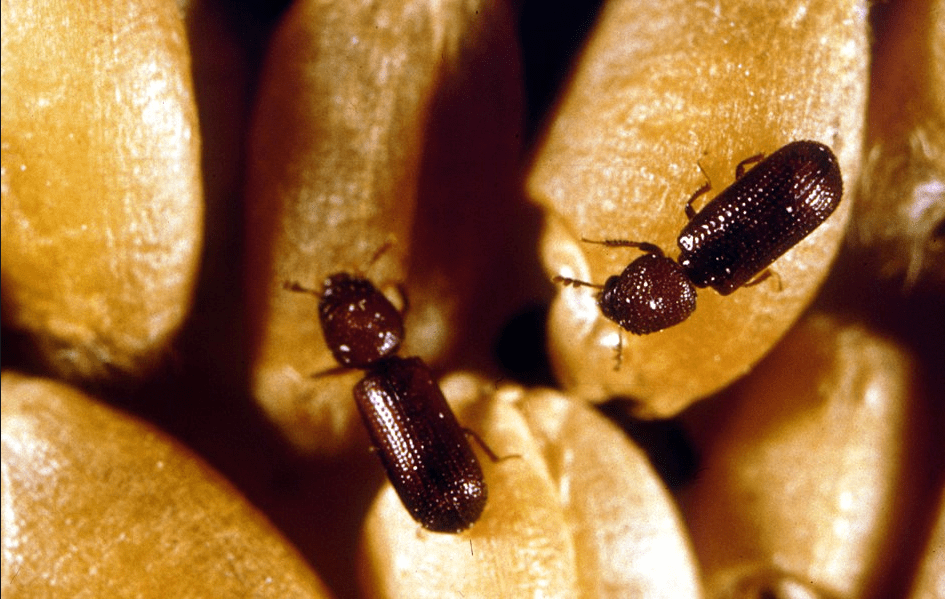
The lesser grain borer is one of the pests which can infest stored grain, and trials have shown it can be controlled using combination treatments incorporating Flavocide. Photo: CSIRO
A COLLABORATION between the Grains Research and Development Corporation and a small Australian bio-company is moving closer to developing a next-generated stored-grain insecticide, the first new approach in 30 years.
Combination treatments including the insecticide called Flavocide reportedly control lesser grain
borer, flour beetle, saw-toothed grain beetle, flat grain beetle and rice weevil in grain storages
for up to 13 months; nine-month residual control is considered an industry standard.
In an ASX announcement in May, GRDC endorsed future registration of the chemically synthesised insecticide for grain storage.
“It offers a unique alternative mode of action to the current commercially available products and, with that, the potential to deal with increasing insecticide resistance in stored grain pests,” GRDC stated.
Using CSIRO and external technology, Melbourne-based Bio-Gene Technology Ltd developed a proprietary chemical process creating flavesone, something it calls a “nature-identical compound” found in plants and based on chemicals known as beta-triketones.
GRDC provided general support for trials and, in 2019, provided a two-year grant to help develop the product.
Other project partners included BASF and Queensland’s Department of Agriculture and Fisheries.
“Combination treatments with Flavocide have been shown to control the full spectrum of key pests evaluated, including strains with a history of multiple resistance to currently used insecticides,” GRDC said.
Field efficacy tests indicated that Flavocide, used in combination at low rates, offered more than nine months of control of susceptible pest strains and between three and nine months for highly chemical-resistant strains.
Bio-Gene currently holds two patents in Australia and the United States relating to the use of Flavocide.
Since the efficacy trial program finished late last year, Bio-Gene’s research focus has shifted to meeting regulatory requirements in domestic and overseas markets, including supporting toxicological testing and other registration-enabling studies.
This will include establishing maximum residue levels in various grain commodities.
The company will also undertake additional research into how the treatment effects specific uses of grain, such as barley for malting.
“Application of Flavocide as a grain protectant relies on efficient application of the product,” Bio-Gene executive director research and development Peter May said.
“As a grain protectant, it will be a liquid product sprayed on to grain as it is transferred to storages such as silos, sheds and bunkers.
“The aim is to coat the grain with sufficient product to provide long-term protection from insect pest attack.
“Other potential applications of Flavocide include in-field foliar sprays, seed-coating treatments and applications in non-crop situations such as space sprays and surface sprays for flying and crawling pest control.”
Bio-Gene’s other headline product is Qcide, an oil extracted from leaves of a eucalyptus species, the
Gympie messmate.

Bio-Gene CEO Richard Jagger.
Research dating back 20 years found that the leaves express high levels of tasmanone, a natural compound that shows evidence of insecticide efficacy.
The trees are farmed intensively in Queensland by sub-contractors and the company has filed PBR applications for high-tasmanone tree cultivars.
Bio-Gene, a $17.2-million listed company, anticipates its two products will be suitable for a range of uses including household spray products, in malaria and dengue control, and in animal and crop production, in particular as a bulwark against increasing insecticide resistance.
It currently has three commercial partners for its products.
Mr May said the company is currently looking for business partners to collaborate in the registration and development of Flavocide in Australia and globally, especially for use in the grain protection market.
“We are excited by GRDC’s continued support for the development and commercialisation of Flavocide,” Bio-Gene CEO Richard Jagger said.
“We will leverage GRDC’s expertise and industry know-how to deliver our products to commercially relevant organisations and developing new partnerships.”
Grain Central: Get our free news straight to your inbox – Click here

HAVE YOUR SAY